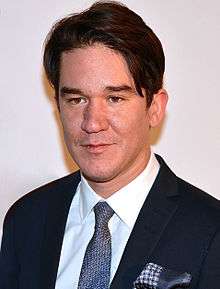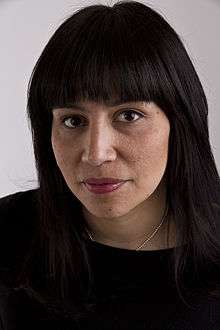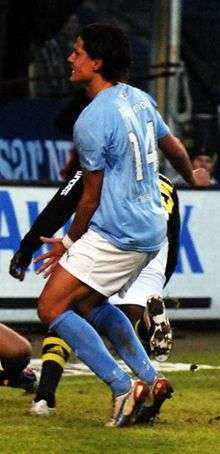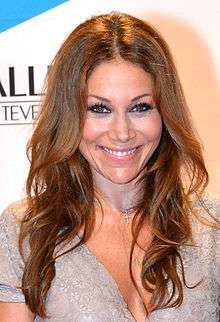Chilean Swedes
Notable Chilean Swedes: | |||||||
| Total population | |||||||
|---|---|---|---|---|---|---|---|
|
(50,000 (est.) (ca. 0.5% of the Swedish population)) | |||||||
| Regions with significant populations | |||||||
| Stockholm, Göteborg, Malmö | |||||||
| Languages | |||||||
| Swedish, Chilean Spanish | |||||||
| Religion | |||||||
| Irreligion, Atheism, Roman Catholicism, and Evangelicalism | |||||||
Chilean Swedes are Chilean immigrants in Sweden and citizens of Sweden who are of Chilean ancestry.
Population
It is estimated that some 50,000 people have Chilean background (first and second generation).[1] Earlier estimations were 45,000 (2008).
History
Origins
Before the 1973 Chilean coup d'état, there were some 90 Chileans in Sweden.[2] Compared to other Latin American countries, Chile had a tradition of democratic rule and relative political stability. The early stages of mass migration were mainly consistent of politicians, militants, intellectuals and other left-leaning elements seeking political refuge, but recent arrivals usually involve working-class Chileans in search of better living conditions for themselves and their families. Today many live in the bigger cities such as Gothenburg, Malmö and Stockholm. Chilean Swedes are the largest and most prominent group among Latin American communities residing in Sweden.
The Coup 1973
Chilean people started immigrating in the 1970s in order to escape the dictatorship of Augusto Pinochet. Sweden was known to be a social democratic country and the government allowed refugees to come to Sweden. But for many the time adapting to the new country was difficult. Language barriers, colder weather and monopolies on TV, radio and alcohol sales, for example, were a huge contrast to Chile. Many who came to Sweden continued to support the overthrown government of Salvador Allende. When Sweden was scheduled to play a Davis Cup tennis match against Chile in 1975, a large protest movement instigated by the Chilean diaspora sought to boycott the match and have it cancelled. The Hoola Bandoola Band even wrote a song titled "Stoppa matchen" ("Stop the match"). Almost 10,000 people demonstrated against the decision to play the match, which was eventually held as scheduled, but without spectators. When Milton Friedman received his Nobel Prize in 1976, similar protests organized both by Swedes and Chileans were once again seen on the streets.
After the coup
During the 1980s, after Pinochet's economic reforms many poverty-stricken Chileans left their home country in hope to seek better opportunities in Sweden, where there was already a sizable presence of Chileans arrived in the previous decade. Some helped the newly arrived so they could integrate in the Swedish society. For a short period immigration from Chile increased after the 1970s and once again peaked. Today Chile is considered to be democratic and prosperous by Latin American standards, which has decreased immigration after the installation of a democratic government in 1990. Chileans who want to visit Sweden can stay three months without a visa thanks to diplomatic agreements between the countries. On the other hand, for Chileans who want to stay permanently in Sweden, it has become much more difficult for them to gain a permanent visa.
The group is considered today to be one of the most well-integrated within Swedish society. This perception of assimilation resulted in Sveriges Radio (Swedish Public Radio) to announce that they would stop broadcasting news in Spanish in 2005 . Most Chilean Swedes are irreligious or atheist, as the first wave consisted mainly of Marxist supporters of Allende, whereas practicing Catholics tended to support Pinochet. Some are Catholics and celebrate Easter, Christmas and New Year in the same days as the Swedes. They are the largest Latin American group in Sweden and celebrate their culture in ways such as commemorating Chilean Independence Day or Fiestas Patrias. Thus they keep alive Chilean folk traditions such as the cueca and huaso costumes.
Notable people
- Luciano Astudillo, politician active in the Social Democratic Party
- Sergio Badilla Castillo, poet
- Erik Bongcam-Rudloff, biologist and scientist
- Sebastian Castro-Tello, football/soccer player
- Matias Concha, football/soccer player
- Miiko Albornoz, football/soccer player
- Malin Diaz, football/soccer player
- Rossana Dinamarca, politician, member of parliament, active in the Left Party
- Rafael Edholm, actor Chilean father
- Daniel Espinosa, film director, Chilean father
- Marcello Ferrada-Noli, professor and scientist. Founder of MIR (former left-wing guerrilla organization during Pinochet's dictatorship)
- Daniela Lincoln Saavedra, female long jumper
- Pablo Piñones-Arce, football/soccer player
- Mauricio Rojas, former leftist (MIR) now politician for Folkpartiet (Swedish Liberal Party)
- America Vera Zavala, politician, active in the Left Party
- The Latin Kings, rap group from Stockholm
References
- ↑ . 2012 http://sverigesradio.se/sida/artikel.aspx?programid=3993&artikel=5642418.
I dag beräknas det bo ungefär 50 000 med chilensk bakgrund (första och andra generationens invandrare) i Sverige. Källa: Nationalencyklopedin, Migrationsverket, SCB
Missing or empty|title=(help) - ↑ http://www.fokus.se/2010/03/en-svensk-katastrof/






